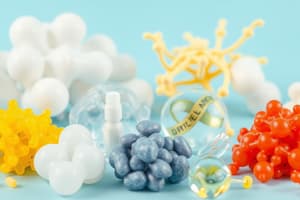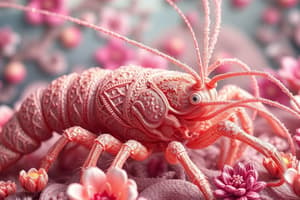Podcast
Questions and Answers
Which would be classified as a natural polymer?
Which would be classified as a natural polymer?
- Polyester
- Nylon
- Cellulose (correct)
- Polystyrene
A polymer is a large molecule:
A polymer is a large molecule:
- Made up of long chains of atoms covalently bonded together. (correct)
- Always made up of identical monomer units.
- Made up of long chains of atoms held together by hydrogen bonds.
- Made up of a large lattice structure held together by ionic bonds.
A monomer is a:
A monomer is a:
- Polymer made from only one component.
- Polymer molecule that only contains a single element.
- Small molecule used to make a polymer chain. (correct)
- Single polymer chain.
Which would be classified as a synthetic polymer?
Which would be classified as a synthetic polymer?
Which of these statements are correct for addition polymerization only? (Select all that apply)
Which of these statements are correct for addition polymerization only? (Select all that apply)
How are HDPE and LDPE different?
How are HDPE and LDPE different?
Nathaniel Wyeth developed plastic soft drink bottles. They are made from which polymer?
Nathaniel Wyeth developed plastic soft drink bottles. They are made from which polymer?
Polyvinyl chloride (PVC) is used in:
Polyvinyl chloride (PVC) is used in:
The Big Six polymers are all classified as thermoplastics because they:
The Big Six polymers are all classified as thermoplastics because they:
Which polymer is incorrectly matched with its use?
Which polymer is incorrectly matched with its use?
The molecules that are added to polymers to make them softer and more pliable are known as:
The molecules that are added to polymers to make them softer and more pliable are known as:
What do the letters HDPE represent?
What do the letters HDPE represent?
Why is crude oil currently the only raw material from which synthetic polymers can be made?
Why is crude oil currently the only raw material from which synthetic polymers can be made?
Will synthetic polymers always have to be made from crude oil?
Will synthetic polymers always have to be made from crude oil?
This represents a step in the addition polymerization of ethylene. What do chemists call the species 'R'?
This represents a step in the addition polymerization of ethylene. What do chemists call the species 'R'?
Which statement is false?
Which statement is false?
Which one is not a polymer?
Which one is not a polymer?
Study Notes
Natural and Synthetic Polymers
- Natural polymer example: cellulose
- Synthetic polymer example: nylon
Definition of Polymers
- A polymer consists of long chains of atoms covalently bonded.
Definition of Monomers
- A monomer is a small molecule that forms polymer chains.
Addition Polymerization
- Monomer units bond together without losing any atoms, generating a product that retains all the original atoms.
- Incorrect statement: Condensation polymerization involves the loss of small molecules like water.
Polymer Classifications
- HDPE and LDPE differ structurally; HDPE has linear chains, whereas LDPE has branched chains.
- The Big Six polymers are classified as thermoplastics due to their ability to be melted and reshaped.
Specific Polymers and Their Uses
- PET is used for soft drink bottles.
- PVC is commonly used in plumbing pipes.
- Incorrect use association: PS (polystyrene) is not used for contact lenses.
Enhancements for Polymers
- Plasticizers are additives used to make polymers softer and more pliable.
High-Density Polyethylene
- HDPE stands for high density polyethylene, significant in plastic manufacturing.
Raw Materials for Synthetic Polymers
- Crude oil is the primary raw material due to its convenience and cost-effectiveness.
- New technologies aim to use bio-based raw materials, reducing reliance on crude oil.
Free Radicals in Polymerization
- In the addition polymerization process, species denoted as "R" are referred to as radicals.
Identifying Polymers
- Polytech is not a polymer compared to polyethylene, polystyrene, and polyvinyl chloride.
Polymer Structure
- Polymers exhibit regions where molecules are neatly and tightly arranged in a regular pattern.
Studying That Suits You
Use AI to generate personalized quizzes and flashcards to suit your learning preferences.
Description
Test your knowledge of polymers with these flashcards from Chapter 9 of Chemistry in Context. Identify natural polymers and understand the structure of large molecules. Perfect for reviewing key concepts in materials chemistry.




